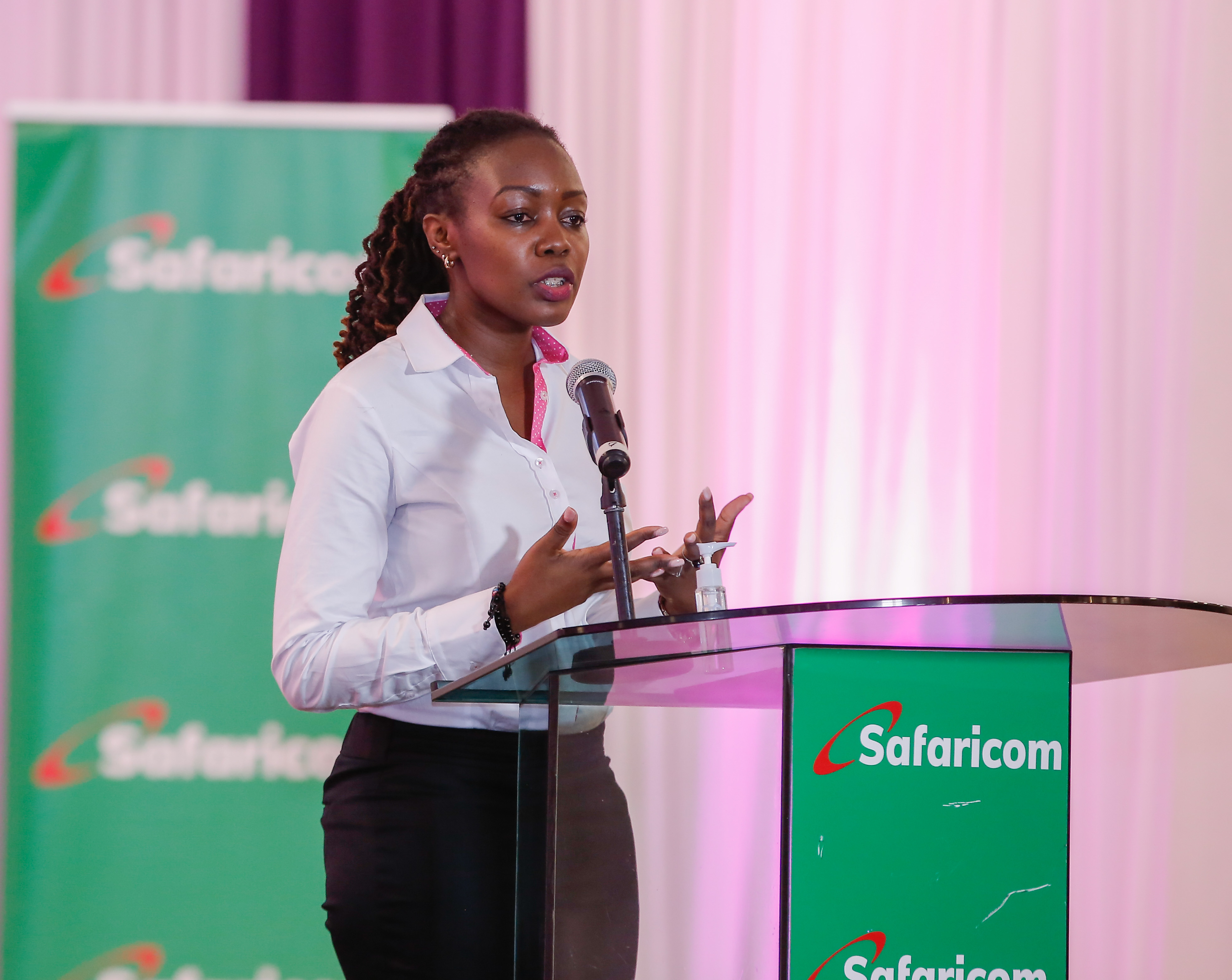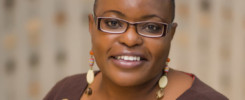Meet Donna Rege-Ondiege, techie commercial enthusiast and Head of Women in Technology at Safaricom
By Malemba Mkongo, Kenyan correspondent

Donna Rege-Ondiege is a techie commercial enthusiast currently working with Kenya’s telecom giant Safaricom’s Agritech startup, Digifarm. She is an ocean of skills, life, fun and laughter who lives to support the less fortunate, build and grow others and aspires for productive gender equality and representation. On another side, Donna is a mother, wife, daughter and sister.
Tell us something more about your journey and career in STEM.
In my early years of education, I wanted to be a doctor. However, my uncle, a budding engineer who had built a career for himself abroad influenced me into changing my career path. I admired his work therefore wanted to be an engineer. I joined Kenyatta University to do an undergraduate degree in Bsc. Telecommuncation & IT Engineering. The journey was not easy, we were 5 girls in my class with about 70 boys, apart from the brains, several other skills and support systems were necessary to survive this phase. Naturally forming a group of friends of 2 girls and 3 gentlemen, we fought hard and finally I graduated amongst the only 3 girls and about 30 boys in our class who graduated that year. On completion, I did not tarmac for long and landed a internship/work opportunity, which is something many Kenyan youths today are struggling with. Years into practicing as a techie in Safaricom, I realized, I had an opportunity to leverage my passion with my personality and get a satisfying career and therefore joined Daystar University for MA in Corporate communication. In 2014, I was the first lady to be appointed to assist manage Safaricom’s technology partners covering partner & finance management.
I later volunteered as a champion for the Women In Technology initiative handling the communication and networking docket and I also was part of the 15member Tech Fed team that successfully oversaw the great culture change within the Technology division and this also led to the birth of Rugby4Good Tournament – a touch rugby tournament in partnership with Safaricom technical and finance partners seeking to raise funds to equip 1 school per county with a computer lab. In 2019, I moved to the Ecommerce department to assist in building the startup based on my partner management experience and technical content skills, and later that year moved again to assist in starting up DigiFarm, a platform that hosts more than 1.3 smallholder farmers in Kenya endeavoring to improve their wealth.
In 2020 I was additionally elected to lead the first Kenyan Women in Technology initiative by Safaricom PLC founded in 2012.
Few years ago, technology was considered to be a predominately masculine career, how is it now compared to when you joined the industry?
The industry is getting better with the numerous efforts being put in by several initiatives from private companies, the government, educational institutions and even individuals. The growth is not commensurate with the effort but we believe we are getting there, like when Safaricom Women In Technology was launched in 2012, we were only 8 percent women within the technology division and currently we are at 23 percent. However it is greatly motivating as institutions like the Government are putting in more to help inspire and motivate more women and youth to take up technology careers. Additionally, before and during this pandemic we have seen a lot of success stories around women in technical spaces and leadership e.g. appointments of Agnes Gathaiya to Google Country Director EA, Vodafone Ghana CEO – Paricia Obo-Nai, Cellulant Country Manager – Faith Nkatha, KenGen CEO 7 MD – Rebecca Miano, Glovo Country General Manager – Priscilla muhiu,
Working in various capacities in Kenya’s telecom giant, what has been your experience?
The experience has been exhilarating and great despite bumps here and there. Safaricom PLC is a great employer and I just don’t mention this to be cliché. I have always had 2 roles or more running concurrently at Safaricom and this is because, the organization has intentionally made these opportunities available and well positioned that one can excel at all. The learning I have picked from this experience is for one to be self-aware , to know themselves, be themselves, seek and take up what speaks to oneself. In addition, building full proof social capital, putting in the work and being open minded is quite necessary.
What are some of the risks you have taken to ensure you climb the success ladder?
For me, my vision to thrive in challenging spaces has led me to risk applying roles that were not in my comfort zone but spoke to my heart. Especially when I moved from a fully fledged engineering role to seek interest in a more procurement, finance and relationship role. And then pulling a similar stint to move from technology to venture in business roles especially around the start up space. For me, comfort in any role is not an option. A similar big risk was, when I decided to pursue a Master degree in Corporate Communications to layer on a Bachelor Degree in Telecommunication & Information Technology whilst my peers were mostly taking up technical master degrees or certifications and MBAs. I don’t regret it though as it has been an enabler to the great roles I have had over the last six years.
How has your organization under your stewardship changed lives of farmers through Digifarm platform? What was its vision?
Digifarm Kenya Ltd is a subsidiary of and fully owned by Safaricom PLC. Our vision and purpose is to change farmers lives in a commercially sustainable way and being that we are still very young, I believe we are making great strides in terms of achieving this. Agriculture being part of Kenya’s big 4 agenda, the solution has been a no brainier and since the need is there, the reception is quite good. And with that we have successfully started seeing our efforts translate such as improvement of livelihoods of our farmers. Lastly we, as Digifarm, pride in partnering and being able to grow other Kenyan SMEs.

You provide leadership to Kenya’s first women in Technology platform, how do you ensure you generate another generation of women in STEM?
Safaricom Women in Technology (WIT) in line with the global sustainable development goals (supporting SDG 4 – Quality Education, SDG 5 -Gender Equality and SDG 9- Industry Innovation and Infrastructure) is an initiative of passionate women who form a Technology Incubator with an aim of strategically and consistently helping to nurture young generation of students that will form fit for future creators and innovators for next generation employment and entrepreneurship. This is achieved through six key programs (Kidz Go tech, 47/47 High school Outreach, Technovation Challenge, Campus outreach , Technology academy and Internal & Networking) aimed at reaching out to the girl child at various stages of her education cycle by continuously providing support through coaching, mentorship, exposure to evolving technologies, technical platforms and networks. This is to facilitate onboarding, building and retention of the number of women within the STEM careers. Currently I lead the initiative by working closely with the group of passionate ladies to ensure we are consistently engaging and working to meet our vision of continuously increasing the ignition and uptake of STEM courses. I work to ensure we are making strategic and purposeful partnerships with organizations like Oracle, Microsoft, Huawei and Fireside Communications; and lastly working closely with our HR to grow and develop these ladies career expertise and into leadership.
At the moment, is there a change of attitude towards women in STEM or it is still the same as years ago?
There is definitely a change , we see more interest and especially being that the female gender plays a great role in the community development, and with the several initiatives showing technology as an enabler for community development, many women and girls are gaining interest and greatly embracing these opportunities to improve their own and community livelihoods. However, there is still a lot to be done to achieve balance or parity.
As a country, are we making strides in encouraging girls to join STEM? If yes, is there an increase of girls in STEM or they are still shying away from this path?
Yes we are making great strides, and this evident with statistics like the 2019 report by Kenya Universities and Colleges Central placement Service showed a 139 percent increase from 2018 of girls’ uptake of STEM courses and our internal growth as Safaricom with women in technology division rising from 8 percent to 23 percent over the last 8 years.
How can we use technology to enhance the livelihood of women not only in Kenya, but in Africa?
Based on the evolution and digitization trends, science and technology is at the fore front of being utilized to help solve most societal challenges or issues being faced. Women and girls encounter first hand so many challenges in the various roles they play in their day to day lives as they serve their communities. I believe women who understands the problems need to learn and gain the basic technical skills to design and implement solutions. Also, from the many leadership roles that the women play within their communities, they can convert these solutions to viable business proposition that they can scale and monetize easily and effectively.
As a tech-savvy, are you satisfied with the role which women in STEM have played during this pandemic?
I’m proud of the fact that despite the disruption by Covid 19, Safaricom Women In Technology and several other like minded organizations like Women In Technology Huawei, Pwani Teknogirls, etc, have weathered the storm and leveraged on technology to still be consistent and deliver the message to their target groups across the globe on matters regarding STEM adoption and leadership opportunities. They have done this through several webinars, videos and blogs to mentor and inspire especially the young girls during the vacuum disconnect from school and facing different life challenges at home.
Is the government giving enough support towards women’s success? Do we have enough policies and goodwill to ensure women climb the success ladder?
The government is taking part in the support but there is still much more they can assist with especially within the education ministry in terms of policies, to influence the constant review of the curricula, especially for high school and tertiary levels, to accommodate the fast evolution and digitalization the world is facing.
In addition, policies or frameworks to promote balance in the education set up within the country. The lack of equitability cripples most efforts. For example, in the more urbanized areas there is traction and ease of agenda setting, whilst girls in the north are battling totally different challenges and their needs are quite the opposite. Forcing us to adapt our model for such areas where the girls first needs encouragement to attend and stay in school let alone take up STEM subjects and courses is not efficient. There is need for equal opportunity hence calling out for the government to support in this.
What should be done differently, to ensure more success stories of women and girls in STEM?
There are a lot of efforts geared towards this and are turning positively. There is need for patience and consistency to ensure more success stories. Something to consider to do differently is for all initiatives to review their model or approach to be more inclusive especially for the marginalized communities or areas to ensure that they are beneficially part of the conversation and that we push to cover more ground in encouraging our women to embrace technology solutions while factoring several engrained issues like culture and exposure limits within the country and communities.


